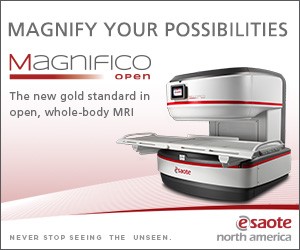▼ ADVERTISEMENT

Editor's E-Note
X-ray is commonly used for many types of conditions, but growing imaging volumes are putting a strain on radiologists' workloads. To help streamline workflow, researchers are applying AI algorithms to help identify X-rays that require additional attention. This month, we're highlighting one of those efforts.
How many X-ray exams does your department perform in a week? Let us know on Twitter and/or Facebook.
Enjoy the newsletter.
— Dave Yeager, editor |
|
|
| In This E-Newsletter
|
▼ ADVERTISEMENT
 |
|
|
▼ ADVERTISEMENT

AI Accurately Identifies Normal and Abnormal Chest X-rays
An AI tool can accurately identify normal and abnormal chest X-rays in a clinical setting, according to a study published in Radiology.
Chest X-rays are used to diagnose a wide variety of conditions of the heart and lungs. An abnormal chest X-ray can be an indication of a range of conditions, including cancer and chronic lung diseases. An AI tool that can accurately differentiate between normal and abnormal chest X-rays would greatly alleviate the heavy workload experienced by radiologists globally.
“There is an exponentially growing demand for medical imaging, especially cross-sectional such as CT and MRI,” says study coauthor Louis Lind Plesner, MD, from the department of radiology at the Herlev and Gentofte Hospital in Copenhagen, Denmark. “Meanwhile, there is a global shortage of trained radiologists. Artificial intelligence has shown great promise but should always be thoroughly tested before any implementation.”
For this retrospective, multicenter study, Plesner and colleagues wanted to determine the reliability of an AI tool that can identify normal and abnormal chest X-rays.
Researchers used a commercially available AI tool to analyze the chest X-rays of 1,529 patients from four hospitals in the capital region of Denmark. Chest X-rays were included from emergency department patients, in-hospital patients, and outpatients. The X-rays were classified by the AI tool as either “high-confidence normal” or “not high-confidence normal,” as in normal and abnormal, respectively.
|
▼ ADVERTISEMENT

AI Outperforms Standard Breast Cancer Risk Model
The standard clinician risk model for predicting breast cancer was outperformed by an AI algorithm, according to a study published in Radiology.
Early Cancer Detection Model Shows Potential
Researchers from the University of Pennsylvania have invented a new way of mapping DNA markings that could see potential use in early cancer detection via liquid biopsies.
Are Genetically Personalized Prostate Cancer Screenings the Future?
Scientists at Stanford Medicine are working on making prostate cancer screenings more personalized by, in addition to performing the standard prostate-specific antigen (PSA) blood test, adding a germline genetic test to look for genetic variables that affect PSA levels. |
▼ ADVERTISEMENT

“Increased access to urgent neurovascular imaging in patients with TIA [transient ischemic attack] may represent a target that could facilitate detection and treatment of modifiable stroke risk factors. … To ensure that risk factors for stroke can be identified and treated, patients with TIA should have improved access to timely neurovascular imaging.”
— Vincent M. Timpone, MD, of the department of radiology at the University of Colorado Hospital, and first author of a study on increased stroke risk in patients receiving incomplete neurovascular imaging for transient ischemic attack
|
|
|
COVER STORY
Battling Burnout
The impact of burnout from the COVID-19 pandemic lingers, even while the pandemic’s protocols dwindle. Experts discuss burnout symptoms and how to combat them.
FEATURE
On Target
Prostate cancer diagnosis and treatment was once an arduous process, but thanks to technological advancements and developments in nuclear medicine, it is becoming easier than ever to detect and treat.
|
|
|
| Advertising Opportunities |
Have a product or service you want to market to radiology professionals? Utilize the reach of Radiology Today Magazine to accomplish your marketing goals. Email our experienced account executives today at sales@gvpub.com or call 800-278-4400 for more information.
|
| © 2023 Radiology Today Magazine |
|
|